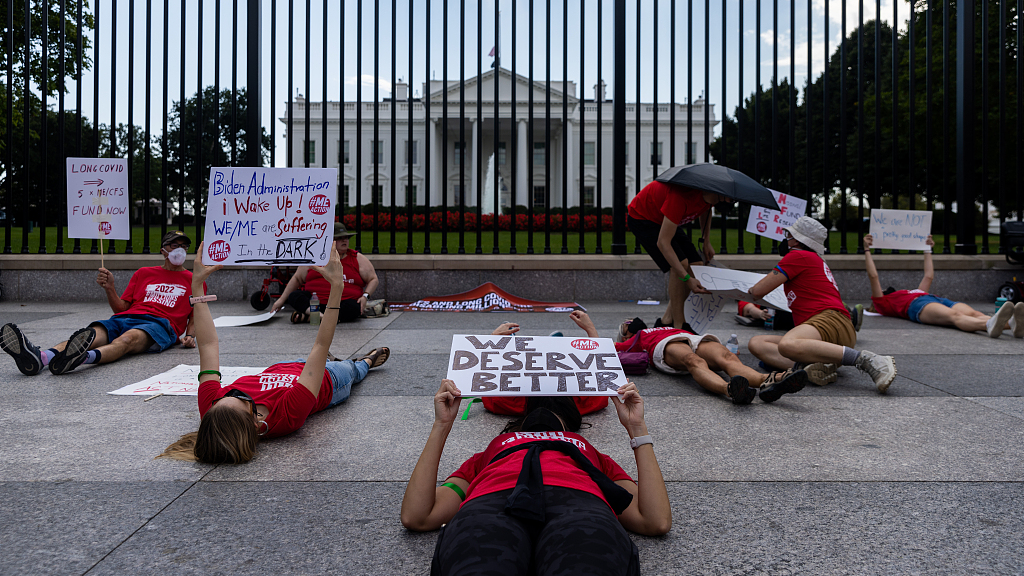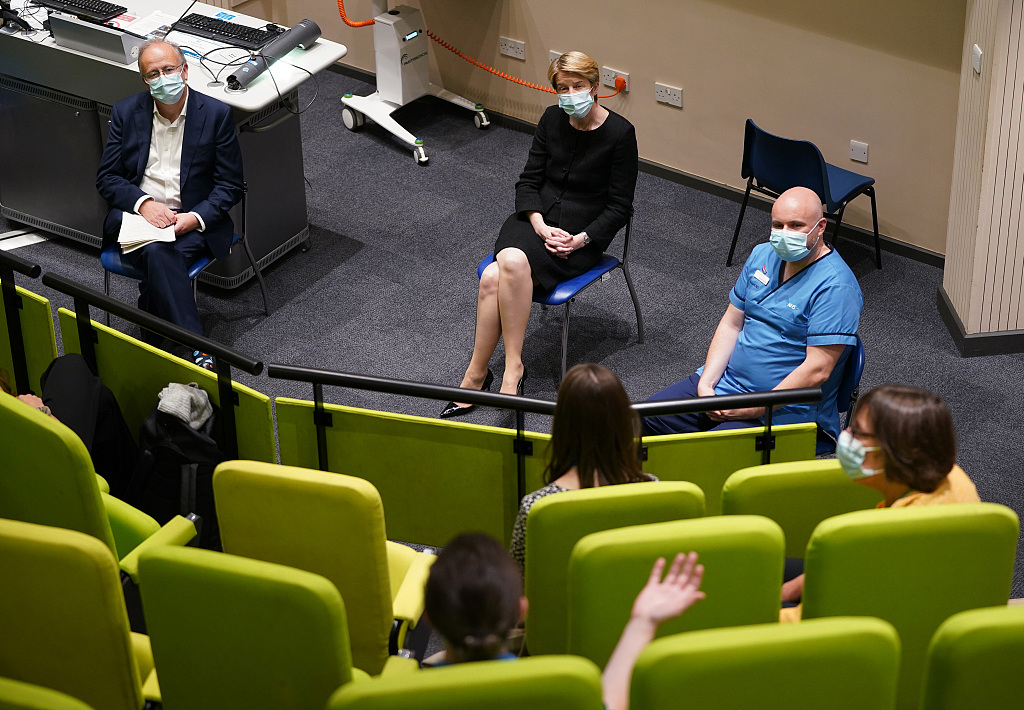
Protestors lay down outside the White House to call attention to those suffering from post-COVID syndrome, in Washington, U.S., September 19, 2022. /CFP
Protestors lay down outside the White House to call attention to those suffering from post-COVID syndrome, in Washington, U.S., September 19, 2022. /CFP
Editor's note: Keith Lamb is a University of Oxford graduate with a Master of Science in Contemporary Chinese Studies. His primary research interests are China's international relations and "socialism with Chinese characteristics." The article reflects the author's opinions and not necessarily the views of CGTN.
When it comes to COVID-19, it's a fact that people are confused. We were told the virus came from Wuhan but scientific evidence proves it was circulating around U.S. military bases in northern Italy well before the Wuhan discovery. Then, classing all deaths as caused by COVID-19, within the window of a 30-day positive test result, has exaggerated an already high UK death rate.
Is COVID-19 serious or not? On one hand, the answer is evidently "yes," hence China was, wrongfully, demonized and Western states eventually enforced their own lockdown. However, despite having months to prepare, Western states did little in terms of stocking up on medical supplies or checking inflight passengers from COVID-19 hit areas, which belies the serious nature of COVID-19.
The nature of the perceived seriousness of COVID-19 can be viewed temporarily and spatially. As COVID-19 mutated and the economy was beginning to suffer, the pandemic "became less serious" as such the official policy, of most Western states, changed to "Living with COVID." In contrast, China's dynamic zero-COVID approach, which has saved millions, is still portrayed as unreasonably harsh by the corporate media.
At any rate, the dead can't complain and the confused living, with memories of the aforementioned contradictions, can take solace that COVID-19 was "never serious anyway." Thus, with COVID-19 fatigue and mass bewilderment, leading to the justification of any policy, the resumption of normal life has been welcomed.
Nonetheless, assuming statistics are accurate, there will be more problems in the long run. For example, the loss of a child's primary caregiver, due to COVID-19, will severely impact the U.S. economy 10 years from now. For short election and profit cycles, this won't be a current economic problem. However, the effects of long-COVID, whose symptoms, similar to Ebola and SARS, include chronic pain, neurological issues, fatigue, chest tightness, and trouble breathing, are already having an impact which will only continue.
This "pandemic after the pandemic" is not a small problem. According to the UK's Office of National Statistics and the U.S. Center for Disease Control and Prevention, two million Britons and 18 million Americans, respectively, have long-COVID. Currently, there is no cure and, as reported by the British Medical Journal, those seriously affected are effectively disabled and unable to work. Consequently, those unable to support their families are forced to sell their homes.
The think-tank Center for American Progress detailed that COVID-19 has led to an extra 1.2 million more disabled Americans by the end of 2021. The Brookings Institution details that long-COVID is keeping four million Americans out of work. This has led to a recent report by Time Magazine describing long-COVID as "the greatest mass-disabling event in human history."
In the UK, the Bank of England highlighted that long-COVID has led to an absence of 440,000 missing workers. Worryingly, there are more than 10,000 absent health care staff from the British National Health Service since 2020.

Chief Executive Officer of National Health Service England, Amanda Pritchard, meets newly-qualified nurses at St Mary's Hospital in London as part of the We are the NHS recruitment campaign, October 18, 2021. /CFP
Chief Executive Officer of National Health Service England, Amanda Pritchard, meets newly-qualified nurses at St Mary's Hospital in London as part of the We are the NHS recruitment campaign, October 18, 2021. /CFP
With lost wages, broken families, and an increased strain on healthcare systems, as well as social services, how can long-COVID be anything but a blight on the health of a nation? With 60,000 people, in the U.S., testing positive for COVID-19, daily, and one-fifth of them getting long-COVID, there will be no quick fixes for this problem, which is not getting adequate funding or recognition.
Considering the UK and the U.S. with developed social and healthcare systems face this harsh reality, it would have been foolish for developing China, with its dense population, to follow the same suit. It must be remembered that China has long-term plans which extend beyond an election or profit cycle and covers more people than just the winners of a Darwinian race.
Explaining the disconnected and contradictory policies of Western states toward COVID-19, which has led to mass confusion and a high casualty rate, is that their policy is driven by the whims of global capital. On one hand, these globalists have no responsibility to a state, which is their "host." On the other hand, states, such as China, which can act independently for the good of the society at large, threaten interests disconnected from state power. Consequently, COVID-19 simultaneously becomes the "demonic Chinese plague" while also being an "overreaction to the flu" which threatens economic life.
This confusion carries on today with long-COVID. On one hand, Western state power and its citizens, who have fought for limited social gains, are valuable as this is the form global capital uses to oppose the Global South, as such news to the severity of long-COVID emerges. On the other hand, the overburdening of welfare systems, which could lead to their collapse, is a win for globalist power which despises socialism.
The banks win by taking the homes of those who can't afford their mortgages and while missing workers would be a problem for small businesses, transnational corporations can always relocate or take advantage of open liberal borders to replace lost workers with talent from the Global South.
The million dead due to COVID-19 in the U.S., which is sold as the "price of freedom" and the effects of long-COVID would be described as human rights tragedies if they occurred in China. The narrative would be one of a system where human life is expendable. It is this contradiction that we should ponder as our attention is focused away from home toward the "unreasonable, harsh" measures in China which continue to save lives and prevent long-COVID.
(If you want to contribute and have specific expertise, please contact us at opinions@cgtn.com. Follow @thouse_opinions on Twitter to discover the latest commentaries in the CGTN Opinion Section.)

